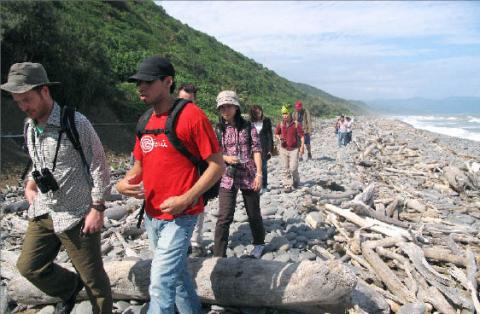Four environmental specialists who participated in the 10th Asia-Pacific NGO Environmental Conference in Taipei visited the historical Alangyi Trail (阿朗壹古道) yesterday and met Pingtung County Commissioner Tsao Chi-hung (曹啟鴻) to share ideas on protecting the trail.
The tour followed on the international NGO conference hosted by the Society of Wilderness which ended on Monday.
The Alangyi Trail, a 12km hiking trail along the Pacific coastline between Taitung County’s Nantian Village (南田) and Pingtung County’s Syuhai Village (旭海), is being threatened by the planned construction of Provincial Highway No. 26. A section of the planned highway would run alongside the trail.

Photo: Tsai Tsung-hsien, Taipei Times
The group of specialists started walking at Nantian and headed south on the pristine trail, passing through the mouth of a stream and walking along the shore covered with round rocks and driftwood, while environmental tour guides from local NGOs explained the ecological features.
Holding a live tree crab in his hands, a tour guide said more than 1,000 crabs per night would cross the trail during breeding season.
After a walk of about 2km along the trail, the group met Tsao at the Pingtung County Hall to share their experiences.
Chairperson of the Asia-Pacific Environmental Council and professor at Tokyo Keizai University, Yayoi Isono, said she loved walking along the ancient trial. She added that it was a beautiful place with many natural resources and hoped the government would protect the area.
A reserve manager at the World Wide Fund for Nature in Hong Kong, Bena Smith, said rather than always opposing construction, NGOs should provide alternatives and reach compromises with developers or the government.
Pierre Fidenci, founder and president of Endangered Species International, said the matter reminded him of a case in southern France, where activists spent a few years stopping the construction of a highway.
He said tourism was very important in France and that the people and government had gradually learned that “tourism is not only about convenient transportation, but also preserving the beautiful landscape the way it is” and “making it unique can also increase the number of tourists over the years.”
Stuart Rosewarne, of the department of political economy at the University of Sydney, emphasized that the importance of developing eco-tourism is not to over-develop areas, but to educate tourists to be environmentally aware.
Tsao said the nature reserve’s resources and landscape are precious assets, but the government faces heavy pressure from local residents to build the highway. This is because they were taught that transportation is the most important aspect of tourism and improving their lives, and do not fully understand the benefits of keeping the area pristine.
“When we want to protect a natural attraction [in Japan], it is also hard to have dialogue with the local people, because some of them want economic development or convenient transportation,” Isono said.
“If that is the case, how to promote dialogue between the government, NGOs and local people should be considered when making plans [for development].”

An essay competition jointly organized by a local writing society and a publisher affiliated with the Chinese Communist Party (CCP) might have contravened the Act Governing Relations Between the People of the Taiwan Area and the Mainland Area (臺灣地區與大陸地區人民關係條例), the Mainland Affairs Council (MAC) said on Thursday. “In this case, the partner organization is clearly an agency under the CCP’s Fujian Provincial Committee,” MAC Deputy Minister and spokesperson Liang Wen-chieh (梁文傑) said at a news briefing in Taipei. “It also involves bringing Taiwanese students to China with all-expenses-paid arrangements to attend award ceremonies and camps,” Liang said. Those two “characteristics” are typically sufficient

A magnitude 5.9 earthquake that struck about 33km off the coast of Hualien City was the "main shock" in a series of quakes in the area, with aftershocks expected over the next three days, the Central Weather Administration (CWA) said yesterday. Prior to the magnitude 5.9 quake shaking most of Taiwan at 6:53pm yesterday, six other earthquakes stronger than a magnitude of 4, starting with a magnitude 5.5 quake at 6:09pm, occurred in the area. CWA Seismological Center Director Wu Chien-fu (吳健富) confirmed that the quakes were all part of the same series and that the magnitude 5.5 temblor was

The brilliant blue waters, thick foliage and bucolic atmosphere on this seemingly idyllic archipelago deep in the Pacific Ocean belie the key role it now plays in a titanic geopolitical struggle. Palau is again on the front line as China, and the US and its allies prepare their forces in an intensifying contest for control over the Asia-Pacific region. The democratic nation of just 17,000 people hosts US-controlled airstrips and soon-to-be-completed radar installations that the US military describes as “critical” to monitoring vast swathes of water and airspace. It is also a key piece of the second island chain, a string of

The Central Weather Administration has issued a heat alert for southeastern Taiwan, warning of temperatures as high as 36°C today, while alerting some coastal areas of strong winds later in the day. Kaohsiung’s Neimen District (內門) and Pingtung County’s Neipu Township (內埔) are under an orange heat alert, which warns of temperatures as high as 36°C for three consecutive days, the CWA said, citing southwest winds. The heat would also extend to Tainan’s Nansi (楠西) and Yujing (玉井) districts, as well as Pingtung’s Gaoshu (高樹), Yanpu (鹽埔) and Majia (瑪家) townships, it said, forecasting highs of up to 36°C in those areas